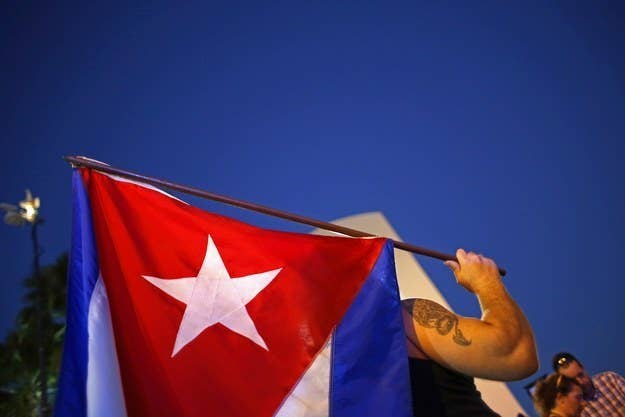
MIAMI — Anti-Castro demonstrations in Miami used to draw thousands, but only a few hundred showed up to protest the biggest thaw in Cuban–American relations in more than half a century. After 50 years of trying to oust the Cuban regime, the epicenter of anti-Castro sentiment in America may be ready for a change.
Versailles restaurant is the historic home of Miami's anti-Castro multitudes. Whenever something important happens back home, this restaurant in Little Havana is where Cuban exiles gather, usually loudly and in large numbers.
But on Wednesday night, after the announcement that President Obama will revive diplomatic relations with Cuba for the first time since 1961, the crowd was more loud than it was large.
Lt. Al Borges, a Cuban-American who has been with the Miami Police Department for 25 years, said the crowds were notably thinner than they were even just a few years ago in 2008, when Fidel Castro stepped down as president and rumors swirled about his impending death. That time there were at least 2,000 in the streets. On Wednesday, Borges estimated, the crowd never surpassed 200. By midnight, not a late hour by Cuban standards, it had petered down to less than 20.
"Once most of the TV cameras left, the people left," Borges said.
For decades, Miami's Cuban exile community has been the epicenter of unwavering opposition to Cuba's communist regime. El exilio changed U.S. politics, ensuring that the American stance toward Cuba remained antagonistic and helping to elect and defeat presidents on the strength of their commitment to anti-Castro dogma.
But as the oldest and bitterest of the exile generation has faded, and after a half-century of isolation failed to oust the Castro regime, Wednesday's historic move showed more clearly than ever that things in Miami have changed.
This is not to say that the crowd outside Versailles was meek. A provocateur wearing stars and stripes as a kerchief and a Communist-red flag tucked into his waistband held a small sign reading "Viva Obama." About a dozen protesters harangued him incessantly, occasionally breaking out into chants: "Abajo Obama! Viva Jeb Bush! Viva Bush!"
Leandro Seoane, a 50-year-old man with close-cropped gray hair and blue Chuck Taylors, strolled around the crowd wearing a faded Obama T-shirt from the 2008 campaign. Seoane said that he was surprised and delighted by Obama's move: Decades of embargo had done nothing to weaken the Castro regime and instead had profoundly harmed the Cuban people.
"I just don't understand how a Cubano can support the regime," Lexy Montes, 50, told him. "I simply don't understand it."
"I don't support the regime," Seoane replied. "But I do support—"
Before he could finish, Marisela Pompa, 62, told him about how Castro's police had beaten her pregnant 23-year-old daughter, kicking her in the stomach and killing her unborn child. "It's easy to talk when you don't feel the pain in your flesh," she said.
"I understand," Seoane said, but the conversation devolved into impassioned screaming.
In 1980, Seoane, then an openly gay 16-year-old in Cuba, was rounded up with two friends by police on the streets of Havana. Over the course of the night, his prison cell began to fill up with other LGBT youth. It was the beginning of the Mariel boatlift, when the Castro regime shipped wave after wave of "undesirables" to Florida — LGBT people, convicts, mental health patients, Jehovah's Witnesses. Seoane was presented with a choice: Go to Florida or spend four years in prison. He took the boatlift.
For many years, Seoane said, the exile community was monolithic in its opinions, or at least it maintained that appearance. "There were always a lot of people who thought like me, but they stayed quiet," he said. "It was impossible to be in that minority without being called a communist."
Over the last few years Seoane has showed up to various exile protests to express what he calls his dissenting opinions. A decade ago, this would have been unwise at best. Today, he finds there are more and more who think like him and are willing to say so.
There are also fewer people to argue with, even if they argue just as vehemently as before. "These things used to go on for days," he said. "This is just tonight's carnival. That's it."
Referring to the woman whose pregnant daughter was beaten, Seoane said, "She feels tremendous pain. It's horrible. And it's true — all of those things happened. And she thinks I don't understand."
"At some point pain stops solving problems," he said.
